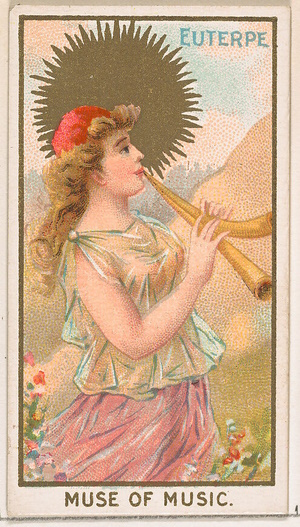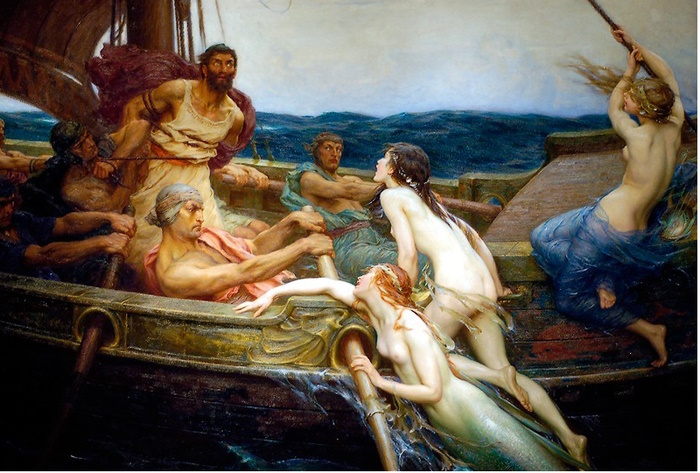 |
Euterpe, hear my prayers and take control of this hand; guide this pen to a worthy essay.
No other medium of art is as sublime as music. It is a universal language requiring no translation. I donít know how it works or why it should work. It is noise with a pattern and syntax. And it isnít just noise, but an enchantment that tingles the skin before soaking all the way to your bones.
Which came first, music or language, or did they spontaneously burst into existence together? My own suspicion is that music came first. I asked several of the members of the Cardiff Writersí Circle and they unanimously agreed it was music.
We have evolved to be social creatures and music binds us. It binds lovers together. It binds church goers together. It binds a stadium of rugby fans together. It raises patriotic feelings that bind an entire nation together. Multiple nations sing the Anthem of Europe, a version of Schillerís Ode to Joy stitched to music by Beethoven. ďFreude! Freude!Ē
Music compels us to embrace. It instills courage and we brazenly march off to war at its beat. Then it laments the dead. It encourages us to progress with hope into a future or raises a longing cry of nostalgia. It contributes feelings to moving images on a screen. It invisibly fills a room and makes us dance like marionettes. Even if we donít leave our seats, our insides dance. Standing, we begin to dance. Sitting, we tap our toes.
When I walk through The Hayes where a busker is performing, my legs take up the beat without my permission. When I stroll through Bute Park, the pace will often give rise to a melody and I begin to hum or sing very, very quietly. This music thing is as intrinsic to humanity as walking. We also sing.
When injuries to the head result in aphasia, the victims can often still sing the lyrics of old songs. When memories decay into ruined neurons like castle walls sieged by time, music takes refuge in the castle keep, the donjon. Today the victims of dementia can take refuge in the Forget-me-not Chorus, where they can bond and share with others songs they still remember and that make them happy.
I fill my life with music while being ashamed that I canít properly sing or play an instrument. Still, I am a frequent concert-goer, living across the street from Saint Davidís Hall. I have a high fidelity sound system in my living room (American for lounge or drawing room). By the bed is a radio kept tuned to classical or jazz. It plays while I sleep.
Tonight, I was at Saint Davidís Hall again. It was the Iceland Symphony Orchestra conducted by Eva Ollikainen. They began with Thorvaldsdottirís Metacosmos. The composer was in the audience and she took a bow. Next came Beethovenís Piano Concerto No. 3 performed by Sir Stephen Hough. He brought his own piano, a shiny black Yamaha that replaced the Hallís usual Steinway. He played notes so hard, I saw his piano shake. After the interval, the orchestra performed Tchaikovskyís Symphony No. 5 in E Minor. Everything was terrific. This is a golden age when there is more talent than ever before, more access to music for the children who seek it and more quality instruments being manufactured.
Music is a key unlocking doors in the mind. Those doors swing open and we enter rooms we thought closed off. And yes, often music causes our hearts to explode, a cloudburst in the eyes. Still, I want to succumb to its power.
It isnít all melancholic memories. I recall the playful relationship when I hear Prokofievís mandolin Aubade from his Romeo and Juliet ballet. Listening to Griegís ďWedding Day at TroldhaugenĒ I relive the happiness of thirty-five years during which two of us wove our lives together. When Borodinís Quartet No. 2 in D major for Strings, 3rd movement comes out of the radio, I look at the pillow on the other side of the bed and think of her asleep beside me, longing for her, but not wishing to wake her. I miss her most when I hear Pucciniís Crisantemi. I die again.
Music is memory, poetry its weak sister. Before the long passages of words were put into the memory of stone carvings and clay scrapings, before epics were memorized onto papyrus and parchment, there was an oral tradition that was sung. Music has the power to bring the dead back into our imaginations, but not even Orpheus could bring the dead back to life.
Still, I want to be tied to the mast. I want to hear the sirenís song.

Ulysses and the Sirens (1909) by Herbert James Draper
![]()
Mr Bentzman will continue to report here regularly about
the events and concerns of his life. If you've any
comments or suggestions, he
would be pleased to hear from you.
You can find his
several books at www.Bentzman.com.
Enshrined
Inside Me, his second collection of
essays, is now available to purchase.
